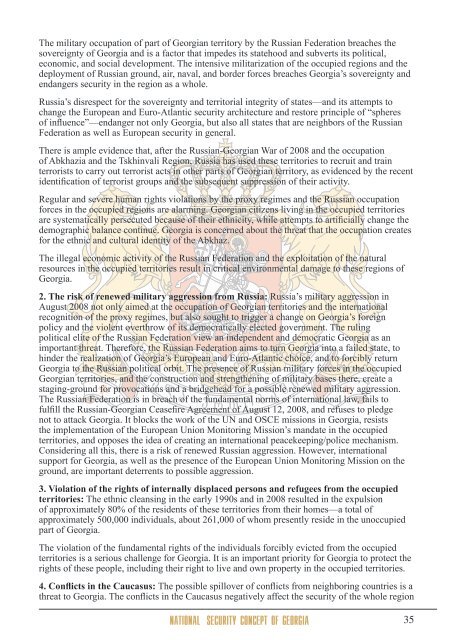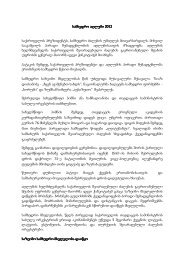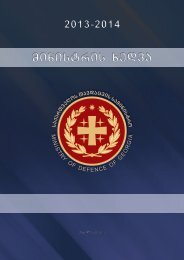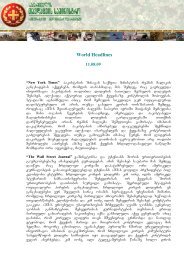saqarTvelos erovnuli usafrTxoebis koncefcia NATIONAL SECURITY
saqarTvelos erovnuli usafrTxoebis koncefcia NATIONAL SECURITY
saqarTvelos erovnuli usafrTxoebis koncefcia NATIONAL SECURITY
Create successful ePaper yourself
Turn your PDF publications into a flip-book with our unique Google optimized e-Paper software.
The military occupation of part of Georgian territory by the Russian Federation breaches the<br />
sovereignty of Georgia and is a factor that impedes its statehood and subverts its political,<br />
economic, and social development. The intensive militarization of the occupied regions and the<br />
deployment of Russian ground, air, naval, and border forces breaches Georgia’s sovereignty and<br />
endangers security in the region as a whole.<br />
Russia’s disrespect for the sovereignty and territorial integrity of states—and its attempts to<br />
change the European and Euro-Atlantic security architecture and restore principle of “spheres<br />
of influence”—endanger not only Georgia, but also all states that are neighbors of the Russian<br />
Federation as well as European security in general.<br />
There is ample evidence that, after the Russian-Georgian War of 2008 and the occupation<br />
of Abkhazia and the Tskhinvali Region, Russia has used these territories to recruit and train<br />
terrorists to carry out terrorist acts in other parts of Georgian territory, as evidenced by the recent<br />
identification of terrorist groups and the subsequent suppression of their activity.<br />
Regular and severe human rights violations by the proxy regimes and the Russian occupation<br />
forces in the occupied regions are alarming. Georgian citizens living in the occupied territories<br />
are systematically persecuted because of their ethnicity, while attempts to artificially change the<br />
demographic balance continue. Georgia is concerned about the threat that the occupation creates<br />
for the ethnic and cultural identity of the Abkhaz.<br />
The illegal economic activity of the Russian Federation and the exploitation of the natural<br />
resources in the occupied territories result in critical environmental damage to these regions of<br />
Georgia.<br />
2. The risk of renewed military aggression from Russia: Russia’s military aggression in<br />
August 2008 not only aimed at the occupation of Georgian territories and the international<br />
recognition of the proxy regimes, but also sought to trigger a change on Georgia’s foreign<br />
policy and the violent overthrow of its democratically elected government. The ruling<br />
political elite of the Russian Federation view an independent and democratic Georgia as an<br />
important threat. Therefore, the Russian Federation aims to turn Georgia into a failed state, to<br />
hinder the realization of Georgia’s European and Euro-Atlantic choice, and to forcibly return<br />
Georgia to the Russian political orbit. The presence of Russian military forces in the occupied<br />
Georgian territories, and the construction and strengthening of military bases there, create a<br />
staging-ground for provocations and a bridgehead for a possible renewed military aggression.<br />
The Russian Federation is in breach of the fundamental norms of international law, fails to<br />
fulfill the Russian-Georgian Ceasefire Agreement of August 12, 2008, and refuses to pledge<br />
not to attack Georgia. It blocks the work of the UN and OSCE missions in Georgia, resists<br />
the implementation of the European Union Monitoring Mission’s mandate in the occupied<br />
territories, and opposes the idea of creating an international peacekeeping/police mechanism.<br />
Considering all this, there is a risk of renewed Russian aggression. However, international<br />
support for Georgia, as well as the presence of the European Union Monitoring Mission on the<br />
ground, are important deterrents to possible aggression.<br />
3. Violation of the rights of internally displaced persons and refugees from the occupied<br />
territories: The ethnic cleansing in the early 1990s and in 2008 resulted in the expulsion<br />
of approximately 80% of the residents of these territories from their homes—a total of<br />
approximately 500,000 individuals, about 261,000 of whom presently reside in the unoccupied<br />
part of Georgia.<br />
The violation of the fundamental rights of the individuals forcibly evicted from the occupied<br />
territories is a serious challenge for Georgia. It is an important priority for Georgia to protect the<br />
rights of these people, including their right to live and own property in the occupied territories.<br />
4. Conflicts in the Caucasus: The possible spillover of conflicts from neighboring countries is a<br />
threat to Georgia. The conflicts in the Caucasus negatively affect the security of the whole region<br />
<strong>NATIONAL</strong> <strong>SECURITY</strong> CONCEPT OF GEORGIA<br />
35
















